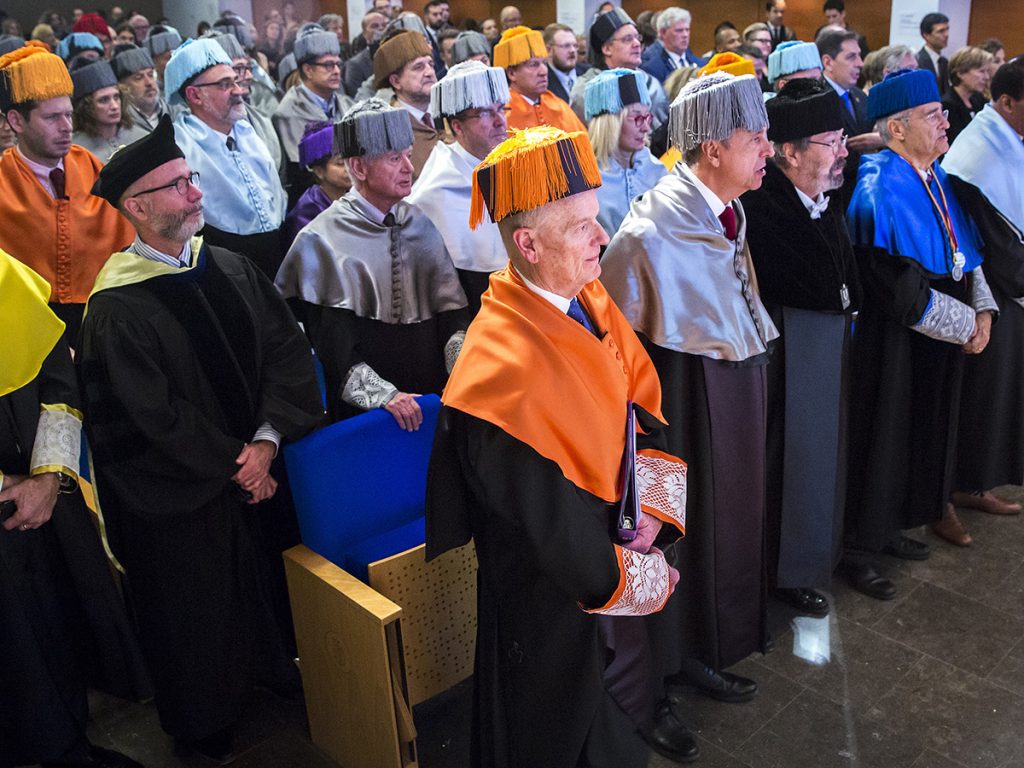Gregory Payne Receives Honoris Causa from Universitat de Ramon Llull

For nearly four decades, Gregory Payne has taught students, peers, organizations, world leaders and nations how to build bridges through communication and diplomacy. In the process, he has built more bridges around the world than we might count.
In recognition for his advancement of global public diplomacy and communication studies, Payne has received one of the highest honors in academia—the Doctor Honoris Causa—from Universitat de Ramon Llull.
Payne accepted his honor on November 15 in Barcelona, before a fully regaled Ramon Lull faculty and full-capacity audience at the Blanquerna School of Communication and International Relations – a place he calls his “second academic home.”
He connected with his colleagues there after leading a study trip of Emerson students to the 1992 Olympics, and together they formed a movement that now involves 15 universities and many shared initiatives around the world.
Five years ago, thanks in large part to Payne’s leadership, Blanquerna and Emerson established the shared Center for Global Communications, formalizing their mutual commitment to research and teaching. By no coincidence, Payne received his honor during the fifth annual Global Communications Summit of the two institutions and their international partners.
Payne was accompanied on this occasion by many of his Emerson colleagues, including President Lee Pelton, Provost Michaela Whelan, School of Communication Dean Raul Reis, several members of the Communications faculty, and even a number of his current students.
In an eloquent introduction of Payne to the honors assembly, Blanquerna Dean Josep Carbonell told the story of his colleague’s professional, intellectual and human growth over several decades — from a dissertation on the rhetoric surrounding the 1970 Kent State University shootings to diplomacy between the U.S and many Islamic nations, to his “bottom-up, citizen-to-citizen diplomacy” across countless associations and educational institutions for the cause of social good. Among his remarks, Carbonell notes:
The qualities we are paying tribute to with this honorary doctorate must now be more than clear: Dr. Payne has excelled in his research and academic work; he has persevered and has grown in his role as a teacher. He has placed his knowledge at the service of the public good and has pursued the noble aim of improving international relations—particularly in the most difficult times and the most perplexing situations—from the grassroots, from knowledge and interchange, and from the aim of recognizing “the other” and establishing connections. He demonstrates the ongoing desire to value social organizations, the grassroots of society, while also taking advantages of opportunities for change coming from politics, and supporting leaders concerned with social change and progress. Dr. Payne is a truly strong-willed and tireless individual, and far from settling for merely fulfilling his role as an academic and as a teacher, he has turned this role into the instrument for all his public and private activities.
[Download the full text of Carbonell’s address.]
In his acceptance address, Payne reflected on the intellectual growth and international experiences of his career, and in particular since he began his work with Barcelona colleagues:
This 28-year journey has had a significant impact on me, and has furthered a core value in my life – a fundamental belief that education is a key conduit in building bridges, not walls – especially in such desperate and divisive times as we live in today … Our task is to embrace the writings and teachings of an ethical rhetoric – and through vivid stories, compelling case studies, and by the way we live our own lives – to communicate the fundamental trait that real leadership is adherence to enduring principles over politics; to embrace values of freedom, tolerance, empathy and respect; to hope not hate; to be an advocate of rhetoric that aims to engage, not enrage; and to embrace public diplomacy and build bridges, not walls.
[Download the full text of Payne’s address.]
Categories